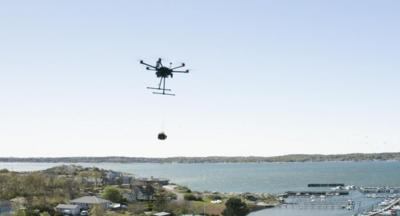Everdrone Airdrops To The Scene Of Cardiac Arrests
In Sweden, Everdrone is now using UAS to deliver Automated External Defibrillators (AEDs) to the scene of cardiac arrests, which will allow bystanders to initiate life-saving measures while they wait for professional medical care.

Everdrone notes that each year, out-of-hospital cardiac arrests affect approximately 275,000 individuals in Europe. The survival rate in these instances is about 10 percent, but that number could increase to as much as 70 percent when CPR and early defibrillation is initiated within the first few minutes, according to research.
The service is part of a clinical study in collaboration with Sweden’s national emergency call center, SOS Alarm, and the Centre for Resuscitation Science at Karolinska Institutet (KI), and is now available to more than 80,000 residents in the Gothenburg area of Sweden.
“By combining our state-of-the-art drone platform and know-how in the regulatory space, we are finally able to launch this life-saving application,” says Mats Sällström, CEO of Everdrone.
“The collaboration with SOS Alarm and KI has been absolutely crucial for the realization of the concept in terms of being able to perform a swift alarm response, and to manage the medical and ethical issues involved.”
Expected to launch in June, the initial study will run through the end of Sept. 2020. Three UAS will be placed in designated locations, ready to respond to emergency 112-calls immediately for emergencies occurring within a radius of six kilometers.
“In the event of a cardiac arrest, the drone is dispatched at the same time as the ambulance and will certainly be the first to arrive on the scene,” explains Mattias Regnell, head of Innovation and Research at SOS Alarm. “Our operators are ready to instruct bystanders on how to initiate the life-saving device.”
When the drone arrives at the designated location, the AED will lower to the ground while the drone remains hovering at 30 meters altitude. Everdrone says that this procedure eliminates several risks associated with landing a drone close to people.
“The method of lowering the defibrillator from the drone with the help of a winch is something we have been developing and testing for a long time,” Sällström says.
“We have performed countless test deliveries in recent months, and the results show that the method works very well.”
According to Everdrone, it is one of just a few companies in the world that has been granted permission to conduct urban drone operations, thanks in large part to its safety portfolio and a long-standing dialogue with authorities.
“Safety is at the core of everything we do at Everdrone. Even though the drones we use are extremely safe in themselves, we still need to foresee every conceivable fault scenario and put solutions in place to handle them,” Sällström says.
Everdrone’s flight system is equipped with obstacle avoidance functionality built on Intel RealSense technology, intelligent route planning that greatly reduces flight time over people, and a certified onboard parachute system, which lowers the risk to people on the ground in the case of a bird strike or critical propulsion failure.
The outcome of the emergency operations will continuously be evaluated within a research study conducted by KI. KI will present the results of the study later this year, with hopes of expanding operations to other parts of Sweden and Europe by next year.
“We see enormous potential for this type of fully-integrated drone system. This study is unique, the first of its kind in the world, and we look forward to objectively evaluating the project together with Everdrone and SOS Alarm,” says Andreas Claesson, associate professor at KI.
 ANN's Daily Aero-Term (04.26.24): DETRESFA (Distress Phrase)
ANN's Daily Aero-Term (04.26.24): DETRESFA (Distress Phrase) Aero-News: Quote of the Day (04.26.24)
Aero-News: Quote of the Day (04.26.24) ANN's Daily Aero-Term (04.27.24): Direct
ANN's Daily Aero-Term (04.27.24): Direct ANN's Daily Aero-Linx (04.27.24)
ANN's Daily Aero-Linx (04.27.24) Aero-News: Quote of the Day (04.27.24)
Aero-News: Quote of the Day (04.27.24)



